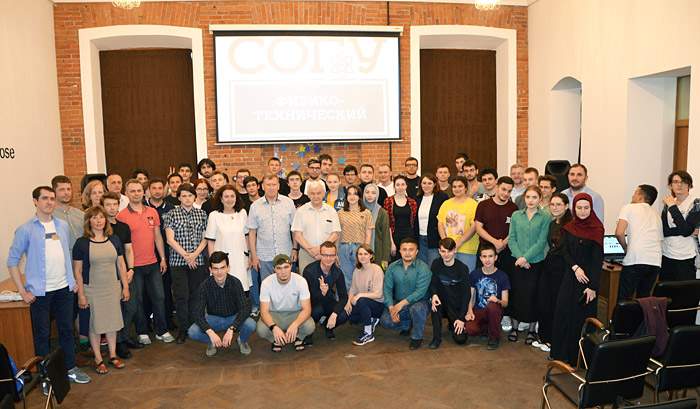
Electronic english version since 2022 |
The newspaper was founded in November 1957
| |
JINR Information Centre at NOSU
hosted IV IT Summer School
The IV IT Summer School on the basis of the JINR Information Centre in Vladikavkaz has become international. For the first time, in addition to universities of the Southern Federal District, universities of other regions and JINR Member States have taken part in the School.
The IV International Summer School for Young Scientists "Modern information technologies for solving scientific and applied problems" took place from 29 June to 1 July on the platform of the JINR Information Centre at North Ossetian State University named after K.L.Khetagurov (NOSU). During 3 days, participants of the School were mastering their theoretical and practical skills. The programme of the event included lectures by researchers of JINR and NOSU, as well as group workshops, so-called tutorials, with a step-by-step explanation of the action plan to achieve the desired result.
Representatives of Kazakhstan and 10 universities of Russia from Vladikavkaz, Nalchik, Grozny, Rostov-on-Don, Maykop, Petropavlovsk-Kamchatsky, Vladivostok, and Tomsk took part in the Summer School at NOSU. The JINR Information Centres operate in the last three cities mentioned as well.
Chairman of Organising Committee of the IT Summer School at NOSU, MLIT JINR Director, Doctor of Technical Sciences Vladimir Korenkov noted that the main aim of the School was to introduce the youth of universities in the region to the field. "We want to give our students an idea of modern computing, parallel and distributed computing, big data analytics, artificial intelligence, so that young people will be ready for global challenges of our time," he stressed.
A VBLHEP chief researcher Richard Lednicky, who directly participated in the opening of the first JINR Information Centre at NOSU, added that the School aimed to train a scientific shift, "We believe that it is very important for young people to have an opportunity to get in touch with big science and outline their future in it. Human potential is very important, since facilities will not operate without people."
The three previous IT Schools were dedicated to such topics as modern computing, parallel and distributed computing, big data analytics, and artificial intelligence. This time, the programme of the School included lectures on JINR scientific projects and information technologies under development for solving scientific tasks. Participants have gained experience in solving applied tasks in the fields related to various aspects of megaprojects, such as the MPD and BM@N experiments, the NICA accelerator complex, the FLAP collaboration experiments at the Linac200 accelerator. Workshops on the organisation of databases, virtualisation and cloud technologies, parallel computing, as well as machine and deep learning technologies for the analysis of highly structured data were held.
Participants of the School discussed both more general issues, such as data processing with the Root package, CAD night vision techniques, and more scientifically oriented topics. The latter included big scientific data analysis, parallel computing technologies for solving applied problems, visualisation of nuclear interactions in photoemulsions, machine learning methods in particle identification tasks, femtoscopy research in high energy physics experiments, information systems to support high energy physics experiments. In addition, participants of the School were introduced to the JINR Multifunctional Information and Computing Complex.
As part of the School, representatives of the recently opened JINR Information Centres in Russia visited the Information Centre at NOSU. The programme of the School included three topical round tables for them. At one of them, Director of the JINR Information Centre at NOSU Nelli Pukhaeva shared the experience gained over three and a half years since the opening of the IC. At other events, participants discussed instruments of mutual integration of the Institute's Information Centers, as well as prospects for cooperation between JINR and the Kabardino-Balkarian State University named after Kh. M. Berbekov (KBSU).
The round table "JINR communication strategy: tools for integration of Information Centres" gathered a wide range of participants. Rector of NOSU Alan Ogoev, Director of MLIT JINR Vladimir Korenkov, heads of the Information Centres at Russian universities, a VBLHEP chief researcher Richard Lednick?, International Cooperation Advisor to JINR Director Irek Suleymanov, Press Secretary of JINR Natalia Zaikina took part in it. At the event, they discussed issues of cross-information and news work of the Centers, subscription to the JINR Newsletter, as well as inclusion of news of the Information Centers in it, IC branding, and development of information leaflets necessary for their work. The participants paid special attention to the communication strategy, the brand book of the Joint Institute, which is being developed at the moment, and scientific diplomacy.
Completing the School, organisers presented prizes to the brightest students who were actively involved in the training, asked the most interesting questions, and were active participants in practical workshops.
The School was organised jointly by NOSU, the Joint Institute, and the JINR Information Centre at NOSU in the South of Russia.
www.jinr.ru
